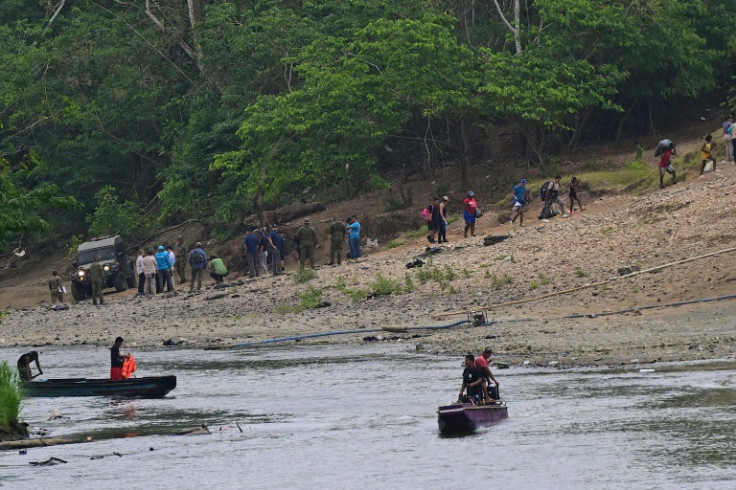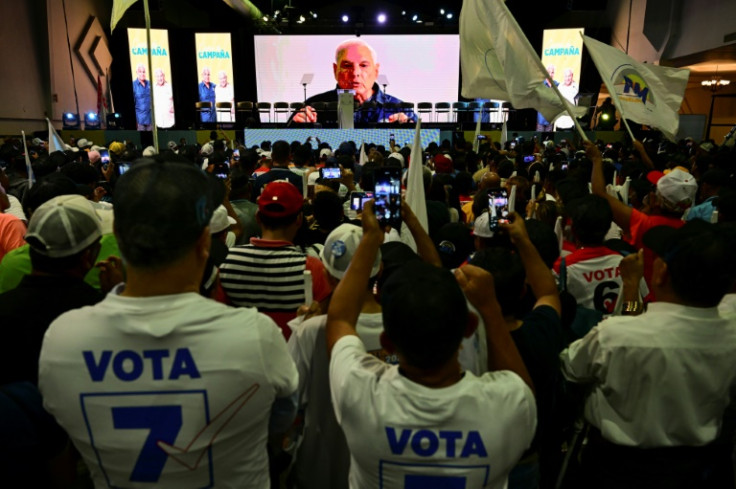Panama Votes In Presidential Election With Eight Contenders

Panamanians voted Sunday in presidential elections featuring a crowded field of eight candidates led by the protege of a former head of state convicted of corruption.
The vote comes as Panama is grappling with deep-rooted corruption, a severe drought that has hobbled its economically critical Panama Canal, and a stream of US-bound migrants passing through its jungles.
Lines formed outside polling stations early in the morning as eligible voters in the Central American country of 4.4 million people cast ballots for a new president, congress and local governments.
Conservative lawyer Jose Raul Mulino, 64, is far ahead in opinion polls, with about 37 percent of voter support, according to the latest survey.
But he was made to wait for a last-minute court decision Friday that finally validated his run. Of the seven other candidates, only three have approached 15 percent support.
Trailing Mulino are social democrat ex-president Martin Torrijos and two center-right politicians: Romulo Roux, foreign minister under ex-president Ricardo Martinelli, and Ricardo Lombana, a former envoy to the United States.
Polls show there are more undecided voters than support for any of Mulino's rivals.
Mulino replaced Martinelli as the candidate for the right-wing Realizing Goals (RM) party after Martinelli lost an appeal against a money-laundering conviction.
The candidacy of Mulino, who had been Martinelli's vice-presidential running mate until the ex-leader's disqualification, was challenged on the basis that he had not won a primary vote or picked his own running mate, as required by law.
The Supreme Court dismissed that complaint Friday in a ruling welcomed by Martinelli, who most Panamanians believe will wield control from behind the scenes, according to a recent poll.
Martinelli, who remains popular in Panama, has taken asylum with his dog Bruno at the Nicaraguan embassy, from which he campaigned for his protege.
After voting Sunday, Mulino went to see Martinelli at the embassy and the two hugged, saying "Brother!" and "We are going to win!", according to a video released by Martinelli.
Many people in Panama long for the days of economic prosperity under Martinelli's government from 2009 to 2014, aided by an infrastructure boom that included the enlargement of the canal and construction of Central America's first metro line.
Polls show voters' main concerns are the high cost of living, access to drinking water and crime.
Panama has no leftist parties and the main candidates for president made similar pledges: create lots of jobs, stimulate the economy, and enact reforms to fight corruption.
"We are in a country that is in a political, social, economic and environmental crisis," said a 74-year-old retiree who gave only her family name, Mollick.
Jennifer Navarro, a 50-year-old teacher, added: "Panama must change. There is too much corruption."
Mulino, who served as Martinelli's public safety chief, has dismissed the criminal case against his former boss as politically motivated, and could soon have the power to pardon him.
On Friday, Panamanian salsa legend and activist Ruben Blades called his compatriots not to vote for a man he described as "a frontman for a confirmed crook."
President Laurentino Cortizo of the majority PRD center-left party will vacate his seat after a term marred by allegations of widespread official corruption, declining foreign investment and rising public debt.
Panama has a presidential one-term limit.
About 45 percent of jobs in Panama today are in the informal market, with unemployment nearing 10 percent.
A third of the rural population lives in poverty.
At the same time, the Panama Canal, which sustains the economy and moves about six percent of the world's maritime trade, has had to limit traffic amid a crippling drought.
Another headache awaiting the newcomer is the Darien Gap between Colombia and Panama, through which more than half a million undocumented migrants passed last year -- subjected to abuses criticized by rights groups.
Three million people are eligible to vote. In this single-round presidential election, whoever gets the most votes wins, even if they are short of a majority.
Panamanians will also elect a new National Assembly.


© Copyright AFP 2025. All rights reserved.





















